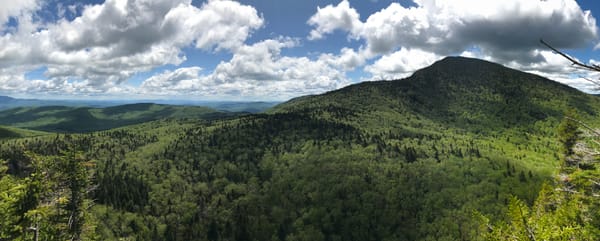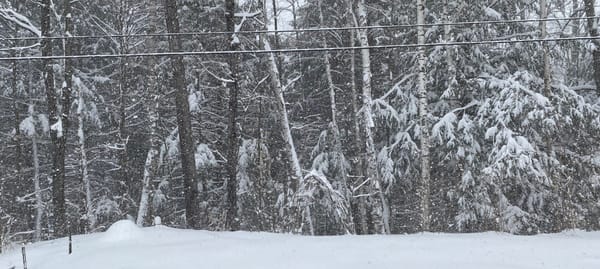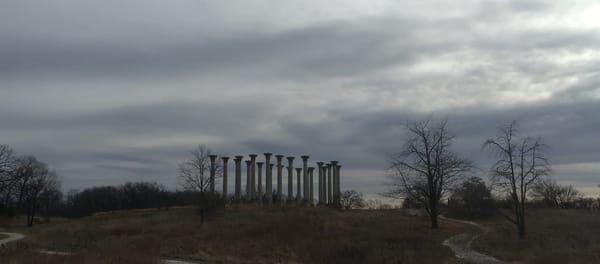The Wars They Want, or: Two Extremisms
I had not anticipated this would be my first Israel-ish post, but I felt compelled to write it in this liminal week between one year and the next, just as this newsletter is getting on its feet.

Hi there. I had a post scheduled to email out on Tuesday afternoon, but then Iran’s missiles were hurdling across the sky and it didn’t feel like a good time to publish my essay about my Judaism and fiction and my mother’s huge influence on why, how, and, what I read. Instead I started writing this, and then I was observing Rosh Hashanah, and now here we are. This is a little more raw than how I like things to be before I share with the world, but if not now, when?
This is the war Bibi wanted.
On Tuesday I watched the rockets exploding above Tel Aviv on the small TV in my mother’s kitchen while she prepped for a Rosh Hashanah lunch for thirty. A field reporter confirmed there were no reported casualties (although we’ve learned since that a Palestinian man in Jericho was killed by the barrage) and was swiftly replaced by a former Israeli Ambassador to America, mongering for war with Iran with the performed weariness of an American neoconservative. He reminded me of Ari Fleischer, the Bush administration mouthpiece who had stood at the press room podium more than twenty years ago and stoked our nation’s appetite for blood and treasure in the run up to the Iraq War.
The garage door churned and a moment later my father entered from a morning of meetings, preparing for Rosh Hashanah services with his colleagues on the bimah. He stopped short in the doorway to the kitchen to get up to speed with CNN.
“This is the war Bibi wanted,” he said.
Last October, when folks proclaimed the Hamas attacks akin to Israel’s 9/11, they were referring to the scale of the tragedy in lost lives relative to population, the degree of unpreparedness amounting to a ‘wake up call’, the trauma of the day. I understood the comparison to an extent, although the proportion of casualties was off by an order of magnitude, and Israel’s national security was already a highly salient and electorally determinative element of the country’s politics.
But the comparison is stunningly accurate in its most nihilistic sense, as we watch Netanyahu take the tragedy of 10/7 as license to steer the country he so corruptly leads into a war that has been long preordained in his mind, and which he plans to instrumentalize for his own political benefit.
A few hours later I gathered with my sisters to watch the Vice Presidential debate, hoping that watching together would make the experience more tolerable.
Like the rest of the Democratic electorate, we have a huge soft spot for Tim Walz. Our family has history in Minnesota, where my grandmother grew up, my parents met, and my younger sister went to college.
Like much of America, we are pretty out on J.D. Vance. Again, there is a bit of extra Zemel family spice: My sisters work in the political hot zones of the 2024 Presidential election—one for an international refugee resettlement agency, the other for an abortion access and reproductive justice campaign. So watching Vance smarm his way through theocratic, nativist talking points with the polished sophistry of a country club conservative was frustrating for all of us.
I became aware of Vance around the time Trump was elected, when folks began to cite his book, Hillbilly Elegy, as a way to “make sense of things.” My dad read it and was unimpressed, preferring the thorough and anthropologically grounded perspective of Arlie Hochschild, who tackled similar sociological themes in her 2016 book Strangers in Their Own Land. I wasn’t surprised, as my dad isn’t much of a memoir reader but truly loves a quality work of cultural anthropology. I was out on Vance based on the coverage of his book. I distinctly remember a substack with a close reading of Elegy where the writer unpacked the condescension with which Vance wrote about the people of post industrial Ohio, and the petulant resentment he heaped on the mannered strivers he met at Yale Law. Another essay cataloged his long association with Peter Thiel, who we won’t get into right now but I can pretty much guarantee you will never read anything positive about in this space. I wish I could find those essays and if it weren’t Rosh Hashanah I’d take the time to track them down for you.
The whole day had me meditating on two of my earliest memories of history, a topic I've been thinking about ever since I learned that my seven-year-old nephew is wildly entertained by a cartoonish billboard of Donald Trump that he encounters every so often while crossing from DC into Virginia. He already knows the guy is a clown, but I wonder what else he's absorbing. Because it's dawned on me how my earliest memories of history are of events which presaged the rising forces of Jewish and American White Christian extremism that shape so much of what it has meant to be a Jew in America for the entirety of my adulthood.
They both took place in 1995, when I was six years old: the Oklahoma City Bombing on April 19, and the assassination of Yitzhak Rabin on November 4.
HERE'S THE top of the Oklahoma City Bombing wikipedia page:
The Oklahoma City bombing was a domestic terrorist truck bombing of the Alfred P. Murrah Federal Building in Oklahoma City, Oklahoma, United States, on April 19, 1995, the second anniversary of the end to the Waco siege. The bombing remains the deadliest act of domestic terrorism in U.S. history.
Perpetrated by anti-government extremists Timothy McVeigh and Terry Nichols, the bombing occurred at 9:02 a.m. and killed 168 people, injured 680, and destroyed more than one-third of the building, which had to be demolished.
What happened in Oklahoma City I understood only amorphously at the time. I think the adults in my life framed the event in the simplest moral terms, that a bad man had done a bad thing, he’d been caught. My natural childhood curiosities and fears were assuaged–some people do very bad things because they are sick or angry, but it didn’t happen very often and I didn’t need to worry about it happening to me. We had a moment of silence at school. Six years later when Timothy McVeigh was executed by lethal injection, I don’t think I knew much more about it than that. Perhaps I was vaguely aware of his anti-government ideology, in the same way that I was vaguely aware during the Bush administration that evangelicals were either garish philosemites or closeted antisemites who opposed most forms of social progress.
I didn’t really understand that these sentiments were linked until Sarah Palin’s vice presidential candidacy and the subsequent rise of the Tea Party, and even then didn’t pay it much attention–similar to JD Vance–before the rise of Donald Trump.
The Soros conspiracies and endorsement from David Duke implied antisemitism was making a comeback, but then Trump won and suddenly it was just there, part of the furniture of American politics. That’s how it felt to me, at least, and I think it’s what I resented the most, that it it felt sudden, and yet scores of journalists and academics were positioned to orient readers to the legions of hate who had suddenly become legitimate actors in the American politic. They had been heading our way for a while for those with the foresight to pay attention. I blamed myself, in a way, for failing to see it coming. There is little a Jew appreciates less than being taken by surprise by history.
HERE'S THE top of the wikipedia page for the assassination of Yitzhak Rabin:
The assassination of Yitzhak Rabin, the fifth prime minister of Israel, took place on 4 November 1995 (12 Marcheshvan 5756 on the Hebrew calendar) at 21:30, at the end of a rally in support of the Oslo Accords at the Kings of Israel Square in Tel Aviv. The assailant was Yigal Amir, an Israeli law student and ultranationalist who radically opposed prime minister Yitzhak Rabin's peace initiative, particularly the signing of the Oslo Accords.
The assassination of Israeli Prime Minister Yitzhak Rabin came immediately after an anti-violence rally in support of the Oslo peace process.
Before the rally, Rabin was disparaged personally by right-wing conservatives and Likud leaders who perceived the peace process as an attempt to forfeit the occupied territories and a capitulation to Israel's enemies.
Rabin’s death was a formative experience in my life. I saw my father weep while we watched Rabin’s funeral. I remember eulogies from Bill Clinton and from Rabin’s granddaughter. I’d spent the second half of the first year of my life living with my parents and my older sister in an apartment in the German quarter of Jerusalem during my father’s first sabbatical. I was in the first grade, but I already sensed Israel was a complicated place.
The Rabin assassination has only grown in meaning to me over time, as I’ve returned to Israel over the years and history has taken course. Rabin was a celebrated defender of Israel and vaunted political leader of the Zionist left whose unflinching acceptance of reality and unyielding pursuit of peace made him a visionary Prime Minister. And he was gunned down after a peace rally by a despicable Jewish zealot. Each time I have visited the square in Tel Aviv where he was killed, I have wept, thinking of Rabin, and of my father, and so many parents and children, and of the never-useless dream of peace.
But as my relationship with Israel has deepened and complexified over time, I’ve come to understand how, for many progressive American Jews for whom this is not a core Jewish memory—which includes practically anyone younger than me, Israel might feel alienating or compromised. There has been so little progress in the years since, particularly after Ariel Sharon suffered a stroke and fell into a coma just as he was on the verge of refashioning Israeli politics in 2005.
THAT WAS 1995. In the nearly 30 years since, these two extremisms have expanded and propagated over the face of the earth like some semi-sentient sludge from a 70s horror B-movie. As we enter 5785, I feel compelled to clearly and unapologetically name these twin plagues as the definitional threats to Jewish life in our time. The fact is, I am increasingly of the opinion that the only meaningful conflict across all of humanity is between extremists and non-extremists.
I had not anticipated this would be my first Israel-ish post, but I felt compelled to write it in this liminal week between one year and the next, just as this newsletter is getting on its feet. Next Tuesday will be the essay about Judaism, fiction, and my mom previously scheduled for this week, and maybe a follow up to this post, too, if I’m still perseverating on all the old extremist men across our planet occupying or seeking positions of power, so intent on making us the object of our own destruction.
Well, it's a new year, and up to us to make it happy.
Take care,
az



